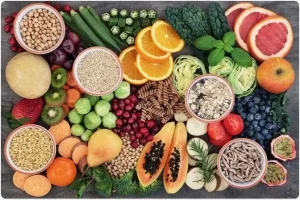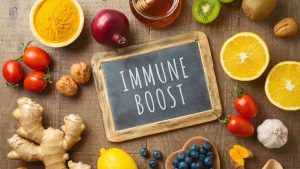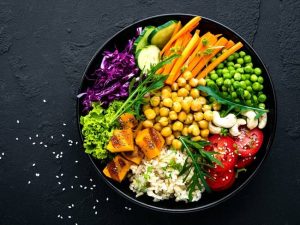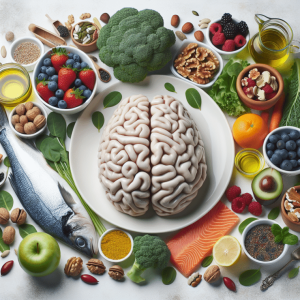Plant Based Food Any food derived from plants, such as grains, beans, nuts, seeds, fruits, and vegetables, is considered plant-based. It promotes entire, organic meals that are beneficial to both the environment and human health. There are two plant-based diets. So, Largely plant-based with some dairy or meat, or completely free of animal products (vegan diets). foods can enhance your health and lower your chance of contracting particular diseases. Aquasana.com
Benefits of Plant Based Food
Foods derived from plants are very beneficial to health. Because of their high nutritional, fiber, and antioxidant content. Thus, they may help lower the risk of diabetes, heart disease, and several types of cancer. Additionally, a plant-based diet can enhance energy levels, enhance digestion. And also, aids in weight management. Eating a greater amount of plant-based food also benefits the environment because it uses fewer resources and emits fewer pollutants than food derived from animals.
1: Eating a Plant-Based Diet Helps in keeping a Healthy Weight.

One of the most crucial things you can do to lower your risk of cancer is to maintain a healthy weight. The one factor that matters more than keeping a healthy weight when it comes to cancer is quitting smoking.
This is because being overweight leads to hormonal imbalances and inflammation. Your chance of developing 12 different cancers, including colorectal, post-menopausal breast, uterine, esophageal, kidney, and pancreatic cancers, is increased if you are overweight or obese.
A plant-based diet eliminates a lot of the things that cause weight gain. You’re headed in the right direction if you combine it with exercise. Discover the True Taste of Baklava Box | Enjoy a 10% discount on select varieties RAKHI24
2: Plants have a lot of Fiber.

All whole plant foods contain fiber. It is what gives the plant its structure, and eating more of it opens up a world of health benefits.
Eating plant-based foods facilitates the healing of your digestive system. Which in turn facilitates the absorption of nutrients that strengthen your immune system and reduce inflammation. Fiber is excellent for maintaining healthy bowel habits and can balance blood sugar and decrease cholesterol. So, Fiber has a critical role in lowering your risk of cancer. This is particularly true for colorectal cancer, the third most frequent type of cancer.
3: Eating Plant-Based Food Reduces the Risk of Other Diseases

There are benefits to eating mostly plant-based foods beyond a decreased risk of cancer.
It has also been shown that a plant-based diet lowers the risk of diabetes, heart disease, stroke, and several mental health conditions.
4: Plant-Based Diets Decrease Inflammation.

The vital nutrients included in plants help to reduce inflammation in the body. Your body employs the same micronutrients and antioxidants that boost immunity to get rid of toxins from processed meals, pollution, germs, viruses, and other sources.
According to Murray, “Plants contain antioxidants that snatch up all these so-called free radicals that can upset your body’s equilibrium.” “Eating a plant-based diet and paying attention to your body’s signals about what foods are good for you can help reduce inflammation.”
Prolonged inflammation has been connected to inflammatory diseases including arthritis and cancer, as well as harming your body’s cells and tissue. Consuming a plant-based diet can potentially shield you from certain diseases by eliminating some of their triggers. Want 15% off your first order?
5: Plant-Based Food Boosts the Function of Your Immune System.

Other foods do not have the essential elements present in plants. Plants contain vitamins, minerals, phytochemicals, and antioxidants that support healthy cell structure and bodily equilibrium, all of which enhance the effectiveness of your immune system.
A health education specialist at MD Anderson, Andrea Murray, says that “plants give your body what it needs to help fight off infection.” So, “Eating a plant-based diet improves your immunity to ward off pathogens and microbes.”
Because a functioning immune system can identify and combat cell abnormalities before they become diseases, it is crucial to lower your chance of developing cancer.
6: Eating Plant-based food reduces the risk of Diabetes

A good way to manage and reduce your risk of diabetes is to switch to a WFPB diet.
A 34% decreased risk of diabetes was observed in individuals who followed a healthy, plant-based eating pattern compared to those who followed harmful, non-plant-based diets, according to a study including over 200,000 participants.
Plant-based diets, particularly those that include nutrient-dense plant foods like fruits, vegetables, whole grains, nuts, and legumes, may help prevent type 2 diabetes, according to another study.
Furthermore, studies on plant-based diets have shown improvements in blood sugar regulation, body weight, and cholesterol levels in diabetics.
A plant-based, whole-food diet may lower your risk of diabetes, heart disease, several types of cancer, and cognitive decline. Shop Gaiam Yoga
7: Deterioration of Cognitive Function

According to certain research, diets high in fruits and vegetables may assist elderly persons delay or avoid cognitive decline and Alzheimer’s disease.
According to several test-tube and animal studies, plant-based diets have a higher concentration of plant chemicals and antioxidants, which may help halt the onset of Alzheimer’s disease and correct cognitive deficits.
Increased consumption of fruits and vegetables has been closely linked to a decrease in cognitive deterioration in numerous studies.
A 20% lower incidence of cognitive impairment or dementia was observed in those who consumed more fruits and vegetables, according to a study of nine trials involving over 31,000 participants.
Plant-based dietary habits may be linked to a lower risk of cognitive impairment and a slower decline in brain function in older persons, according to other studies.
8: Plant-based food Reduce the Risk of Cancer

A plant-based diet may lower your chance of developing some cancers, according to research.
A plant-based diet may help reduce the incidence of breast cancer, according to a study involving nearly 76,000 participants.
More consumption of nutrient-dense plant-based meals was also associated with a decreased risk of aggressive forms of prostate cancer, particularly in males under 65, according to a recent study.
Additionally, an analysis published in 2022 found that plant-based diets may be associated with a decreased risk of malignancies of the digestive system, such as colorectal, pancreas, colon, and rectal cancers. It’s Not a Bottle – it’s a Breathtaking Masterpiece. Adorned with 3,000 Swarovski crystals, TOMO Elité marries timeless elegance with TOMO’s iconic design.
9: Plant-Based Food Good for Heart Diseases

WFPB diets are heart-healthy, which is arguably one of their best-known advantages.
Still, the kinds and caliber of the items in the diet are important.
According to a big study including over 200,000 participants, persons who ate a healthy plant-based diet high in fruits, vegetables, whole grains, legumes, and nuts were much less likely to develop heart disease than people who did not follow a plant-based diet.
However, there was a modest increase in the risk of heart disease linked to less nutrient-dense plant-based diets that contained refined carbohydrates, sugar-filled drinks, and fruit juices.
In a similar vein, several further research indicates that plant-based dieters may be less likely to develop heart disease than meat eaters.
Following a plant-based diet requires consuming the correct sorts of food, which is why a WFPB diet is the greatest option for preventing heart disease.
List of Plant-Based, Whole-Food Foods
- Seeds and Nuts
- Starchy veggies like peas, sweet potatoes, and squash
- Fruits including bananas, kiwis, oranges, peaches, figs, berries, apples, and grapes
- Whole grains include rice, quinoa, buckwheat, and oatmeal.
- Legumes like lentils, beans, and chickpeas
- Plant-based oils, such as avocado or olive oil
- Plant-based meals with minimal processing, like tempeh, nut/seed butter, pea protein, and tomato sauce Shop The Latest Range of Womens Yoga Outfits Today At CSB.
Tips for a Plant-Based Diet
More plant-based options than ever before are available in supermarkets and dining establishments. While others prefer to jump right in, it’s acceptable to start slowly if going cold turkey—or should we say, cold tofu—feels too drastic. As you make the move, consider adding a couple of plant-based meals per week or turning animal products from the main course to a garnish.
Here are some additional pointers for beginning a plant-based diet:
- If necessary, start slowly by obtaining 70–80% of your daily calories from plant-based sources before working your way up to 100%.
- Breakfast is a simple meal to start with. Choose high-protein MacroBars or gluten-free oats garnished with nut butter, chia seeds, and fruit if you’re on the run!
- Always start your plate with roughly half fruit and veggies, then add whole grains and healthy fats to finish it off.
- To make sure you’re getting a range of vitamins and minerals, try to eat a variety of fruits and vegetables.
- Make it easy; don’t let expensive (but wonderful) vegan cheeses or meat substitutes weigh you down unless you want to! A plant-based diet has the advantage of largely consisting of “basics” that can be combined in countless ways.
- Check ingredient labels for less obvious animal products such as albumin, l. cysteine, gelatin, and others.
- Remember that healthy fats are important for hormone balance, cognitive health, satiety, and long-term energy.
- Look for delectable plant-based recipes, such as our vegan chocolate cake, to keep things lively and interesting.
- Be kind to yourself; everyone makes mistakes from time to time. Don’t allow them to stop you from upholding your moral principles.
- Never hesitate to ask questions! If you are worried about the amount of nutrients you are getting, discuss supplementation with your healthcare professional. Save Up To 70% Off Sale & Outlet
Summary
Nutrient-dense plant-based diets, such as fruits, vegetables, grains, nuts, and legumes, have several health advantages. Consuming a plant-based diet can assist in managing weight and enhancing digestion while lowering the risk of diabetes. Like heart disease, and several malignancies. It is also less harmful to the environment than diets based on animals because it requires fewer resources and produces less pollution.
Frequently Asked Question
What kinds of food are plants?
Food is considered to be plant-based .So, if it has undergone minimal processing. All fruits and vegetables, legumes (peas, lentils, tofu, and dry or canned beans). Also, grains, and milk derived from nuts or cereals, nuts, and seeds are considered plant foods.
What does a plant-based product mean?
What does “plant-based” actually mean? And why is it an adjective? to designate a dish, meal, or product? That is composed entirely of plants and is devoid of all animal products, such as dairy, eggs, fish, meat, honey, and any substances that come from animals, like gelatin.
Can vegans eat eggs?
Put another way, plants were combined with sources of protein, like eggs, to provide a filling and balanced meal. A plant-based diet can and should include eggs, and these five ideas show you just how simple it is to use the amazing egg in your plant-forward recipes.
Is eating only plants healthy?
Eating plant-based foods facilitates the healing of your digestive system. Which in turn facilitates the absorption of nutrients that strengthen your immune system and reduce inflammation. Fiber is excellent for maintaining healthy bowel habits and can balance blood sugar and decrease cholesterol.
Is bread made from plants?
Four basic ingredients make up a bread recipe: flour, water, salt, and yeast, which is a sort of microscopic fungus that aids in the rising of bread. Hence, vegan bread is the most basic type. Some varieties, meanwhile, contain extra components, such as fats or sweeteners, both of which may come from animals.










